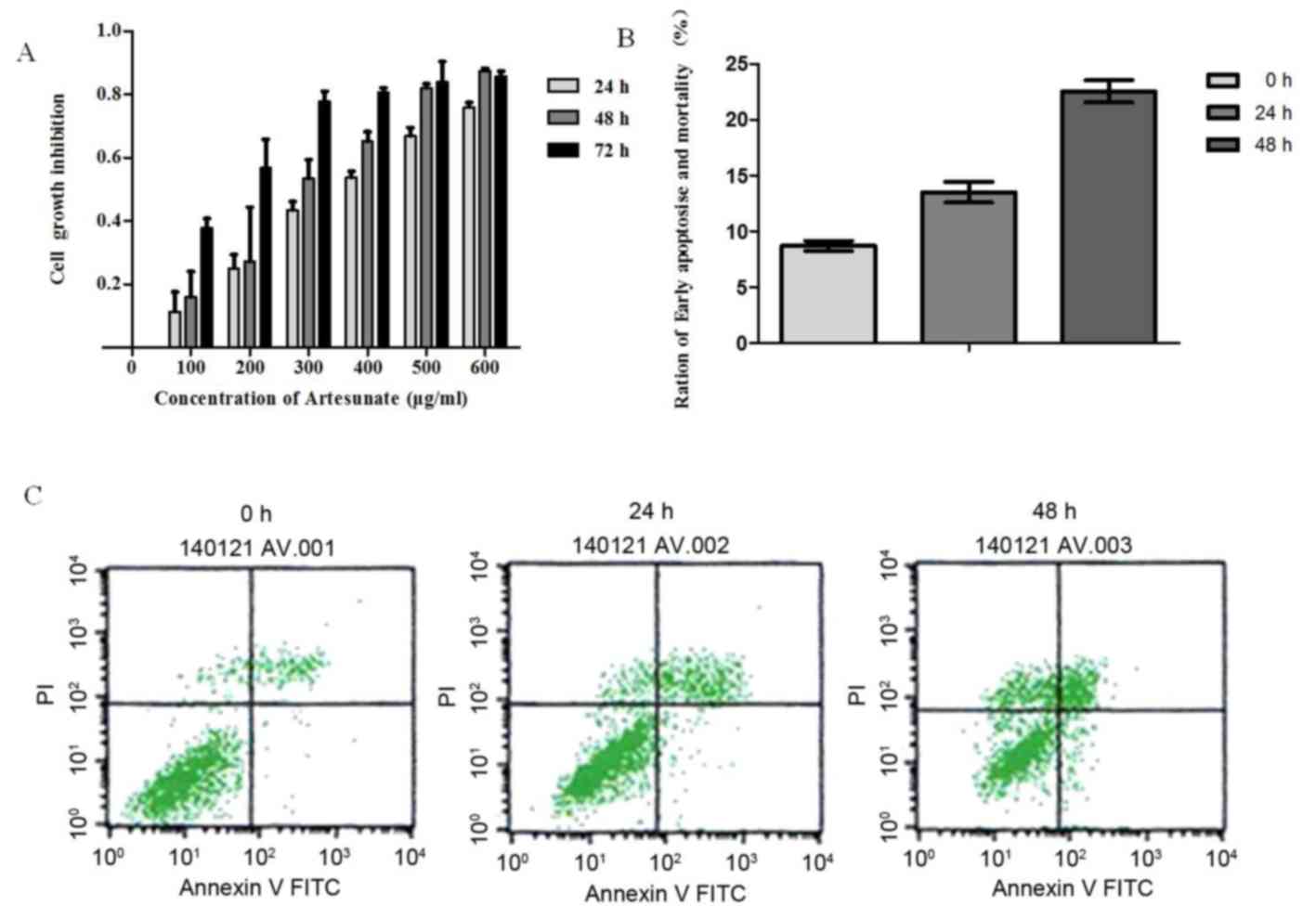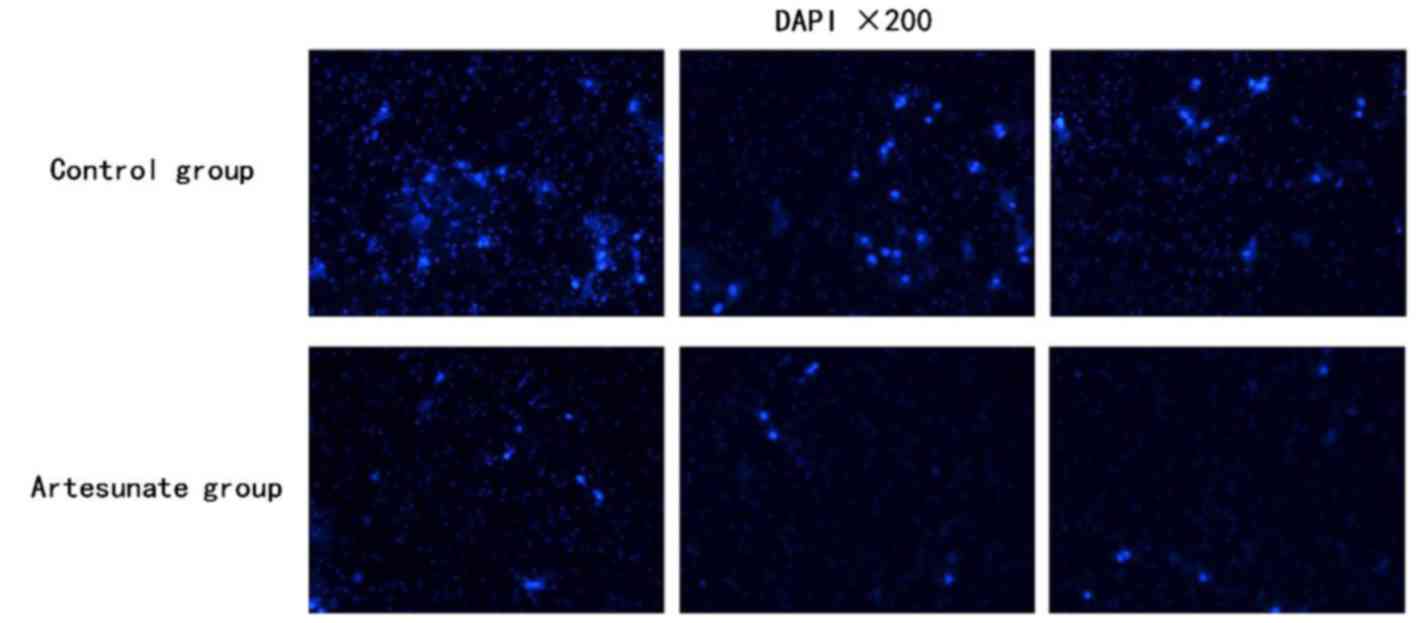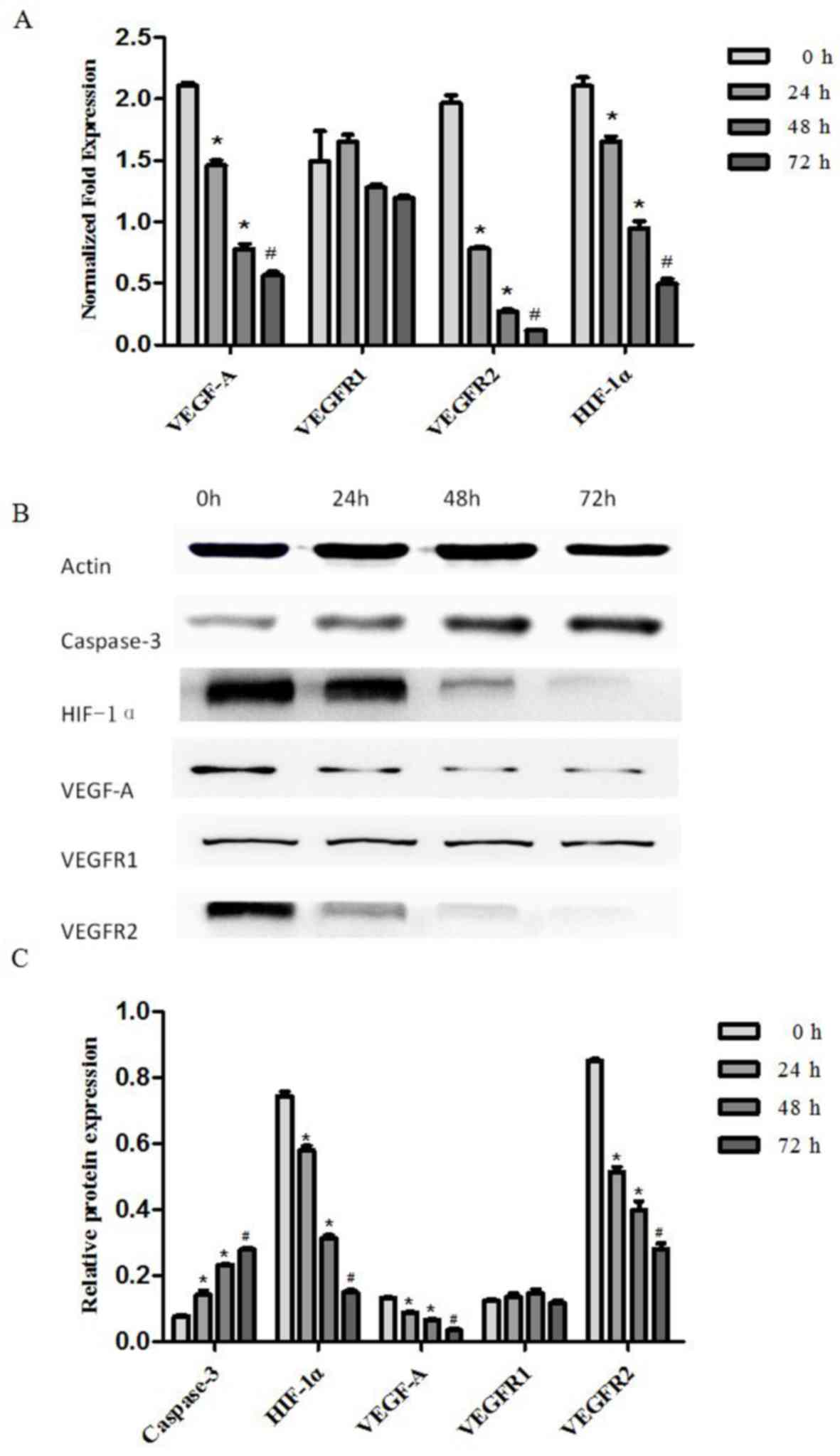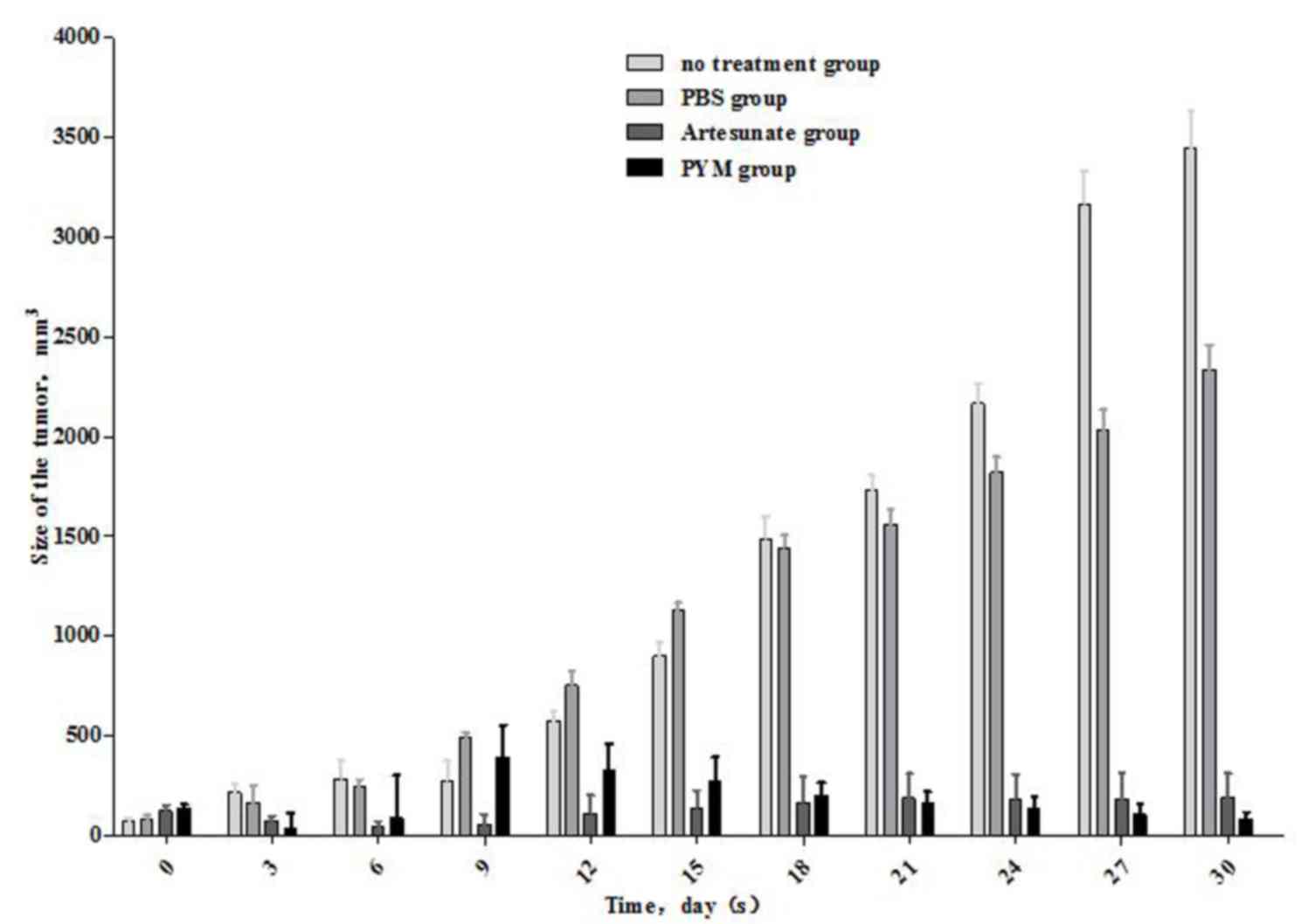|
1
|
Bruckner AL and VFrieden IJ: Hemangiomas
of infancy. J Am Acad Dennatol. 48:477–496. 2003. View Article : Google Scholar
|
|
2
|
Xu D, O TM, Shartava A, Fowles TC, Yang J,
Fink LM, Ward DC, Mihm MC, Waner M and Ma Y: Isolation,
characterization, and in vitro propagation of infantile hemangioma
stem cells and an in vivo mouse model. J Hematol Oncol. 4:542011.
View Article : Google Scholar : PubMed/NCBI
|
|
3
|
Yasui N, Koh K, Kato M, Park MJ, Tomizawa
D, Oshima K, Uchisaka N, Gocho Y, Arakawa A, Seki M, et al:
Kasabach-Merritt phenomenon: A report of 11 cases from a single
institution. J Pediatr Hematol Oncol. 35:554–558. 2013. View Article : Google Scholar : PubMed/NCBI
|
|
4
|
Fernandez-Pineda I, Lopez-Gutierrez JC,
Chocarro G, Bernabeu-Wittel J and Ramirez-Villar GL: Long-term
outcome of vincristine-aspirin-ticlopidine (VAT) therapy for
vascular tumors associated with Kasabach-Merritt phenomenon.
Pediatr Blood Cancer. 60:1478–1481. 2013. View Article : Google Scholar : PubMed/NCBI
|
|
5
|
O'Regan GM, Irvine AD, Yao N, O'Marcaigh
A, Sheridan-Pereira M, Phelan E, McDermott MB, Twomey A, Russell J
and Watson R: Mediastinal and neck kaposiform hemangioendothelioma:
Report of three cases. Pediatr Dermatol. 26:331–337. 2009.
View Article : Google Scholar : PubMed/NCBI
|
|
6
|
Sarkar M, Mulliken JB, Kozakewich HP,
Robertson RL and Burrows PE: Thrombocytopenic coagulopathy
(Kasabach-Merritt phenomenon) is associated with kaposiform
hemangioendothelioma and not with common infantile hemangioma.
Plast Reconstr Surg. 100:1377–1386. 1997. View Article : Google Scholar : PubMed/NCBI
|
|
7
|
Wang Z, Li K, Yao W, Dong K, Xiao X and
Zheng S: Steroid-resistant kaposiform hemangioendothelioma: A
retrospective study of 37 patients treated with vincristine and
long-term follow-up. Pediatr Blood Cancer. 62:577–580. 2015.
View Article : Google Scholar : PubMed/NCBI
|
|
8
|
Enjolras O, Wassef M, Mazoyer E, Frieden
IJ, Rieu PN, Drouet L, Taïeb A, Stalder JF and Escande JP: Infants
with Kasabach-Merritt syndrome do not have ‘true’ hemangiomas. J
Pediatr. 130:631–640. 1997. View Article : Google Scholar : PubMed/NCBI
|
|
9
|
Cooper JG, Edwards SL and Holmes JD:
Kaposiform haemangioendothelioma: Case report and review of the
literature. Br J Plast Surg. 55:163–165. 2002. View Article : Google Scholar : PubMed/NCBI
|
|
10
|
Enjolras O, Mulliken JB, Wassef M, Frieden
IJ, Rieu PN, Burrows PE, Salhi A, Léauté-Labreze C and Kozakewich
HP: Residual lesions after Kasabach-Merritt phenomenon in 41
patients. J Am Acad Dermatol. 42:225–235. 2000. View Article : Google Scholar : PubMed/NCBI
|
|
11
|
Hervella M and Iqlesias ME: Vascular
tumors as syndromic indicators. An Sist Sanit Navar. 27(Suppl 1):
S33–S44. 2004.(In Spanish).
|
|
12
|
Haisley-Royster C, Enjolras O, Frieden IJ,
Garzon M, Lee M, Oranje A, de Laat PC, Madern GC, Gonzalez F,
Frangoul H, et al: Kasabach-Merritt phenomenon: A retrospective
study of treatment with vincristine. J Pediatr Hematol/Oncol.
24:459–462. 2002. View Article : Google Scholar
|
|
13
|
Greenberger S and Bisehoff J: Pathogenesis
of infantile haemangioma. Br J Dermatol. 169:12–19. 2013.
View Article : Google Scholar : PubMed/NCBI
|
|
14
|
Przewratil P, Sitkiewicz A and
Andrzejewska E: Local serum levels of vascular endothelial growth
factor in infantile hemangioma: Intriguing mechanism of endothelial
growth. Cytokine. 49:141–147. 2010. View Article : Google Scholar : PubMed/NCBI
|
|
15
|
Koh GY: Orchestral actions of
angiopoietin-1 in vascular regeneration. Trends Mol Med. 19:31–39.
2013. View Article : Google Scholar : PubMed/NCBI
|
|
16
|
Phng LK and Gerhardt H: Angiogenesis: A
team effort coordinated by notch. Dev Cell. 16:196–208. 2009.
View Article : Google Scholar : PubMed/NCBI
|
|
17
|
Laplante M and Sabatini DM: mTOR signaling
in growth control and disease. Cell. 149:274–293. 2012. View Article : Google Scholar : PubMed/NCBI
|
|
18
|
Léauté-Labrèze C, Dumas de la Roque E,
Hubiche T, Boralevi F, Thambo JB and Taïeb A: Propranolol for
severe hemangiomas of infancy. N Engl J Med. 358:2649–2651. 2008.
View Article : Google Scholar : PubMed/NCBI
|
|
19
|
Sagara I, Beavogui AH, Zongo I, Soulama I,
Borghini-Fuhrer I, Fofana B, Camara D, Somé AF, Coulibaly AS,
Traore OB, et al: Safety and efficacy of re-treatments with
pyronaridine-artesunate in African patients with malaria: A sub
study of the WANECAM randomised trial. Lancet Infect Dis.
16:189–198. 2016. View Article : Google Scholar : PubMed/NCBI
|
|
20
|
Efferth T, Li PC, Konkimalla VS and Kaina
B: From traditional Chinese medicine to rational cancer therapy.
Trends Mol Med. 13:353–361. 2007. View Article : Google Scholar : PubMed/NCBI
|
|
21
|
Zhang LX, Liu ZN, Ye J, Sha M, Qian H, Bu
XH, Luan ZY, Xu XL, Huang AH, Yuan DL, et al: Artesunate exerts an
anti-immunosuppressive effect on cervical cancer by inhibiting PGE2
production and Foxp3 expression. Cell Biol Int. 38:639–646. 2014.
View Article : Google Scholar : PubMed/NCBI
|
|
22
|
Jeong DE, Song HJ, Lim S, Lee SJ, Lim JE,
Nam DH, Joo KM, Jeong BC, Jeon SS, Choi HY and Lee HW: Repurposing
the anti-malarial drug artesunate as a novel therapeutic agent for
metastatic renal cell carcinoma due to its attenuation of tumor
growth, metastasis, and angiogenesis. Oncotarget. 6:33046–33064.
2015. View Article : Google Scholar : PubMed/NCBI
|
|
23
|
Mukanganyama S, Naik YS, Widersten M,
Mannervik B and Hasler JA: Proposed reductive metabolism of
artemisinin by glutathione transferases in vitro. Free Radic Res.
35:427–434. 2001. View Article : Google Scholar : PubMed/NCBI
|
|
24
|
Wang C, Quevedo ME, Lannutti BJ, Gordon
KB, Guo D, Sun W and Paller AS: In vivo gene therapy with
interleukin-12 inhibits primary vascular tumor growth and induces
apoptosis in a mouse model. J Invest Dermatol. 112:775–781. 1999.
View Article : Google Scholar : PubMed/NCBI
|
|
25
|
Sidbury R, Neuschler N, Neuschler E, Sun
P, Wang XQ, Miller R, Tomai M, Puscasiu E, Gugneja S and Paller AS:
Topically applied imiquimod inhibits vascular tumor growth in vivo.
J Invest Dermatol. 121:1205–1209. 2003. View Article : Google Scholar : PubMed/NCBI
|
|
26
|
Livak KJ and Schmittgen TD: Analysis of
relative gene expression data using real-time quantitative PCR and
the 2(-Delta Delta C(T)) method. Methods. 25:402–408. 2001.
View Article : Google Scholar : PubMed/NCBI
|
|
27
|
Alvarez-Mendoza A, Lourdes TS,
Ridaura-Sanz C and Ruiz-Maldonado R: Histopathology of vascular
lesions found in Kasahach-Merritt syndrome: Review based on 13
cases. Pediatr Dev Pathol. 3:556–560. 2000. View Article : Google Scholar : PubMed/NCBI
|
|
28
|
Hammill AM, Wentzel M, Gupta A, Nelson S,
Lucky A, Elluru R, Dasgupta R, Azizkhan RG and Adams DM: Sirolimus
for the treatment of complicated vascular anomalies in children.
Pediatr Blood Cancer. 57:1018–1024. 2011. View Article : Google Scholar : PubMed/NCBI
|
|
29
|
Gordillo GM, Atalay M, Roy S and Sen CK:
Hemangioma model for in vivo angiogenesis: Inducible oxidative
stress and MCP-1 expression in EOMA cells. Methods Enzymol.
352:422–432. 2002. View Article : Google Scholar : PubMed/NCBI
|
|
30
|
Lannutti BJ, Gately ST, Quevedo ME, Soff
GA and Paller AS: Human angiostatin inhibits murine
hemangioendothelioma tumor growth in vivo. Cancer Res.
57:5277–5280. 1997.PubMed/NCBI
|
|
31
|
O'Reilly MS, Brem H and Folkman J:
Treatment of murine hemangioendotheliomas with the angiogenesis
inhibitor AGM-1470. J Pediatr Surg. 30:325–330. 1995. View Article : Google Scholar : PubMed/NCBI
|
|
32
|
Breier G, Albrecht U, Sterrer S and Risau
W: Expression of vascular endothelial growth factor during
embryonic angiogenesis and endothelial cell differentiation.
Development. 114:521–532. 1992.PubMed/NCBI
|
|
33
|
O'Reilly MS, Holmgren L, Shing Y, Chen C,
Rosenthal RA, Moses M, Lane WS, Cao Y, Sage EH and Folkman J:
Angiostatin: A novel angiogenesis inhibitor that mediates the
suppression of metastases by a Lewis lung carcinoma. Cell.
79:315–328. 1994. View Article : Google Scholar : PubMed/NCBI
|
|
34
|
O'Reilly MS, Boehm T, Shing Y, Fukai N,
Vasios G, Lane WS, Flynn E, Birkhead JR, Olsen BR and Folkman J:
Endostatin: An endogenous inhibitor of angiogenesis and tumor
growth. Cell. 88:277–285. 1997. View Article : Google Scholar : PubMed/NCBI
|
|
35
|
Dvorak HF, Brown LF, Detmar M and Dvorak
AM: Vascular permeability factor/vascular endothelial growth
factor, microvascular hyperpermeability, and angiogenesis. Am J
Pathol. 146:1029–1039. 1995.PubMed/NCBI
|
|
36
|
Olsson AK, Dimberg A, Kreuger J and
Claesson-Welsh L: VEGF receptor signalling-in control of vascular
function. Nat Rev Mol Cell Biol. 7:359–371. 2006. View Article : Google Scholar : PubMed/NCBI
|
|
37
|
Manalo DJ, Rowan A, Lavoie T, Natarajan L,
Kelly BD, Ye SQ, Garcia JG and Semenza GL: Transcriptional
regulation of vascular endothelial cell responses to hypoxia by
HIF-1. Blood. 105:659–669. 2005. View Article : Google Scholar : PubMed/NCBI
|
|
38
|
Ferrara N, Gerber HP and LeCouter J: The
biology of VEGF and its receptors. Nat Med. 9:669–676. 2003.
View Article : Google Scholar : PubMed/NCBI
|
|
39
|
Jain RK: Molecular regulation of vessel
maturation. Nat Med. 9:685–693. 2003. View Article : Google Scholar : PubMed/NCBI
|
|
40
|
Iruela-Arispe ML and Dvorak HF:
Angiogenesis: A dynamic balance of stimulators and inhibitors.
Thromb Haemost. 78:672–677. 1997.PubMed/NCBI
|
|
41
|
Chowdri NA, Darzi MA, Fazili Z and Iqbal
S: Intralesional corticosteroid therapy for childhood cutaneous
hemangiomas. Ann Plast Surg. 33:46–51. 1994. View Article : Google Scholar : PubMed/NCBI
|
|
42
|
Cao X, He N, Sun J, Wang S, Ji X, Wang J,
Zhang C, Yang J, Lu T, Li J and Zhang G: Interventional treatment
of huge hepatic cavernous hemangioma. Chin Med J (Engl).
113:927–929. 2000.PubMed/NCBI
|
|
43
|
Medici D and Olsen BR: Rapamycin inhibits
proliferation of hemangioma endothelial cells by reducing
HIF-1-dependent expression of VEGF. PLoS One. 7:e429132012.
View Article : Google Scholar : PubMed/NCBI
|
|
44
|
Chim H, Armijo BS, Miller E, Gliniak C,
Serret MA and Gosain AK: Propranolol induces regression of
hemangioma cells through HIF-1α-mediated inhibition of VEGF-A. Ann
Surg. 256:146–156. 2012. View Article : Google Scholar : PubMed/NCBI
|
|
45
|
Yang ND, Tan SH, Ng S, Shi Y, Zhou J, Tan
KS, Wong WS and Shen HM: Artesunate induces cell death in human
cancer cells via enhancing lysosomal function and lysosomal
degradation of ferritin. J Biol Chem. 289:33425–33441. 2014.
View Article : Google Scholar : PubMed/NCBI
|
|
46
|
Efferth T, Dunstan H, Sauerbrey A, Miyachi
H and Chitambar CR: The anti-malarial artesunate is also active
against cancer. Int J Oncol. 18:767–773. 2001.PubMed/NCBI
|
|
47
|
Chemical studies on qinghaosu
(artemisinine), . China cooperative research group on qinghaosu and
its derivatives as antimalarials. J Tradit Chin Med. 2:3–8.
1982.PubMed/NCBI
|
|
48
|
Douglas NM, Anstey NM, Angus BJ, Nosten F
and Price RN: Artemisinin combination therapy for vivax malaria.
Lancet Infect Dis. 10:405–416. 2010. View Article : Google Scholar : PubMed/NCBI
|
|
49
|
Chan K: Chinese medicinal materials and
their interface with Western medical concepts. J Ethnopharmacol.
96:1–18. 2005. View Article : Google Scholar : PubMed/NCBI
|
|
50
|
Hanahan D and Weinberg RA: Hallmarks of
cancer: The next generation. Cell. 144:646–674. 2011. View Article : Google Scholar : PubMed/NCBI
|
|
51
|
Aggarwal C, Somaiah N and Simon G:
Antiangiogenic agents in the management of non-small cell lung
cancer: Where do we stand now and where are we headed? Cancer Biol
Ther. 13:247–263. 2012. View Article : Google Scholar : PubMed/NCBI
|
|
52
|
Imai K and Takaoka A: Comparing antibody
and small-molecule therapies for cancer. Nat Rev Cancer. 6:714–727.
2006. View Article : Google Scholar : PubMed/NCBI
|
|
53
|
Zhou HJ, Wang WQ, Wu GD, Lee J and Li A:
Artesunate inhibits angiogenesis and downregulates vascular
endothelial growth factor expression in chronic myeloid leukemia
K562 cells. Vascul Pharmacol. 47:131–138. 2007. View Article : Google Scholar : PubMed/NCBI
|
|
54
|
Liao K, Li J and Wang Z:
Dihydroartemisinin inhibits cell proliferation via
AKT/GSK3β/cyclinD1 pathway and induces apoptosis in A549 lung
cancer cells. Int J Clin Exp Pathol. 7:8684–8691. 2014.PubMed/NCBI
|
|
55
|
Tong Y, Liu Y, Zheng H, Zheng L, Liu W, Wu
J, Ou R, Zhang G, Li F, Hu M, et al: Artemisinin and its
derivatives can significantly inhibit lung tumorigenesis and tumor
metastasis through Wnt/β-catenin signaling. Oncotarget.
7:31413–31428. 2016. View Article : Google Scholar : PubMed/NCBI
|
|
56
|
Ma H, Yao Q, Zhang AM, Lin S, Wang XX, Wu
L, Sun JG and Chen ZT: The effects of artesunate on the expression
of EGFR and ABCG2 in A549 human lung cancer cells and a xenograft
model. Molecules. 16:10556–10569. 2011. View Article : Google Scholar : PubMed/NCBI
|


















